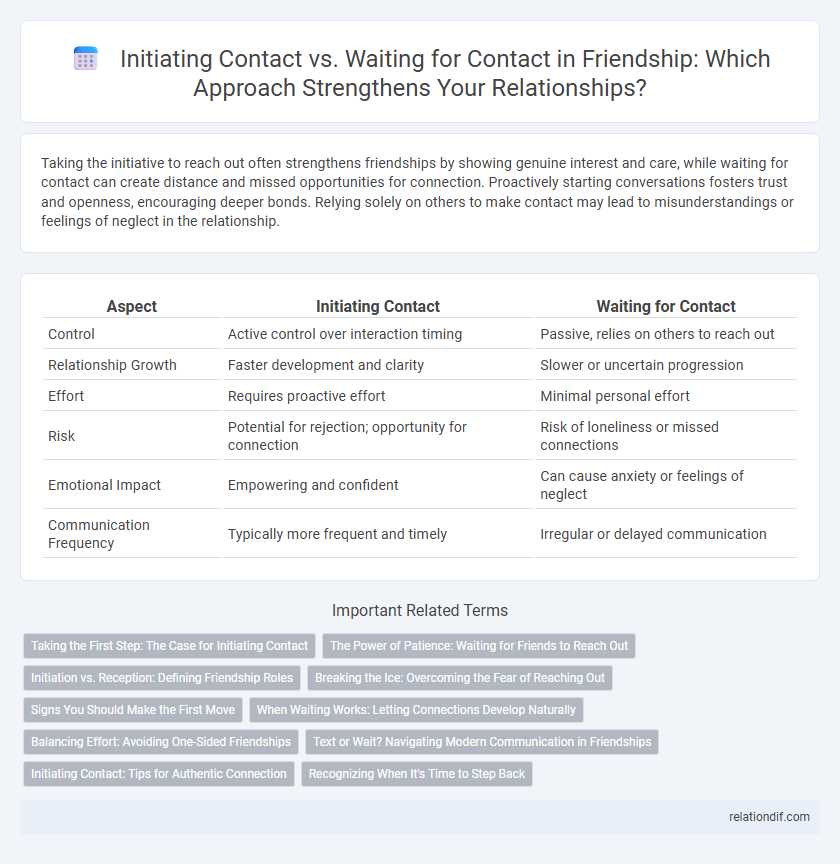Taking the initiative to reach out often strengthens friendships by showing genuine interest and care, while waiting for contact can create distance and missed opportunities for connection. Proactively starting conversations fosters trust and openness, encouraging deeper bonds. Relying solely on others to make contact may lead to misunderstandings or feelings of neglect in the relationship.
Table of Comparison
| Aspect | Initiating Contact | Waiting for Contact |
|---|---|---|
| Control | Active control over interaction timing | Passive, relies on others to reach out |
| Relationship Growth | Faster development and clarity | Slower or uncertain progression |
| Effort | Requires proactive effort | Minimal personal effort |
| Risk | Potential for rejection; opportunity for connection | Risk of loneliness or missed connections |
| Emotional Impact | Empowering and confident | Can cause anxiety or feelings of neglect |
| Communication Frequency | Typically more frequent and timely | Irregular or delayed communication |
Taking the First Step: The Case for Initiating Contact
Taking the first step in initiating contact strengthens friendships by demonstrating genuine interest and breaking social inertia. Studies show that proactive individuals are perceived as more approachable, increasing the likelihood of meaningful connections. Waiting for others to make contact often results in missed opportunities and stagnating relationships.
The Power of Patience: Waiting for Friends to Reach Out
Waiting for friends to reach out demonstrates the power of patience in nurturing genuine connections and respecting personal boundaries. Allowing space for others to initiate contact fosters trust and shows understanding of their individual circumstances and timing. This balanced approach strengthens friendships by emphasizing mutual effort and emotional patience.
Initiation vs. Reception: Defining Friendship Roles
Initiating contact in friendship establishes proactive engagement, signaling interest and willingness to build connection, whereas waiting for contact reflects a more passive reception role that may delay relational development. Research in social psychology highlights that individuals who frequently initiate conversations are often perceived as more approachable and invested in maintaining the friendship. Balancing initiation and reception defines mutual roles that influence the depth and longevity of interpersonal bonds.
Breaking the Ice: Overcoming the Fear of Reaching Out
Breaking the ice in friendship often requires overcoming the fear of initiating contact, which can be rooted in anxiety about rejection or awkwardness. Studies show that taking the first step to reach out significantly increases the likelihood of forming meaningful connections compared to passively waiting for others to make contact. Proactively starting conversations through shared interests or simple greetings fosters trust and lays the foundation for lasting relationships.
Signs You Should Make the First Move
Recognizing signs such as consistent eye contact, frequent smiles, and engaging body language can indicate genuine interest, prompting you to initiate contact. When conversations naturally linger or they respond promptly to messages, it signals openness to deeper connection. Taking the first step based on these cues often leads to stronger, more authentic friendships.
When Waiting Works: Letting Connections Develop Naturally
Waiting to initiate contact can strengthen friendships by allowing bonds to develop organically without pressure or expectation. This natural progression fosters genuine understanding and mutual interest, essential for lasting connections. Trust and comfort grow more effectively when individuals engage at their own pace rather than forced interactions.
Balancing Effort: Avoiding One-Sided Friendships
Balancing effort in friendships requires initiating contact without monopolizing communication to prevent one-sided dynamics. Consistently reaching out while allowing space for reciprocation fosters mutual investment and respect. Maintaining equilibrium in engagement strengthens the foundation of genuine, lasting connections.
Text or Wait? Navigating Modern Communication in Friendships
Texting initiates timely communication, fostering connection through immediate responses and shared experiences, while waiting for contact can create uncertainty and delayed interaction. Studies indicate individuals who proactively text experience higher relationship satisfaction and stronger social bonds. Balancing active outreach with respect for personal space enhances trust and mutual engagement in modern friendships.
Initiating Contact: Tips for Authentic Connection
Initiating contact in friendship requires genuine interest and thoughtful communication, such as asking open-ended questions and sharing personal experiences to foster trust. Proactively reaching out through messages or invitations demonstrates commitment and can break the ice for deeper connections. Consistent, authentic interactions create a foundation for lasting friendships by showing empathy and attentiveness.
Recognizing When It's Time to Step Back
Recognizing when it's time to step back in a friendship involves observing changes in communication patterns and emotional responses. Initiating contact should be balanced with respecting boundaries, especially if repeated attempts go unanswered or feel one-sided. Understanding these signals helps maintain healthy relationships and prevents emotional exhaustion.
initiating contact vs waiting for contact Infographic

 relationdif.com
relationdif.com